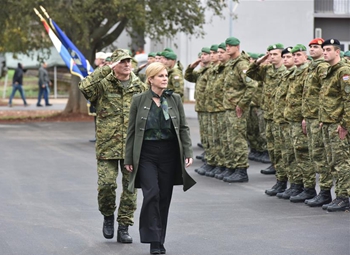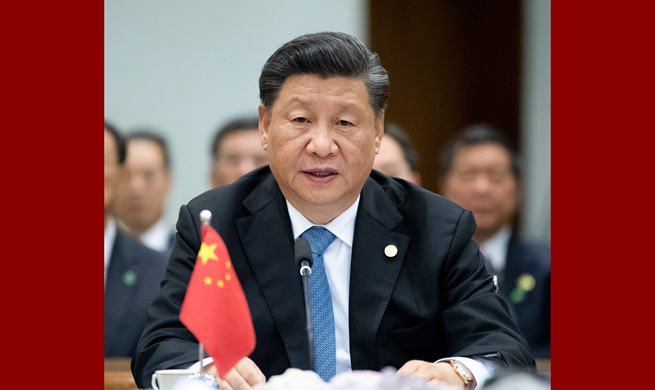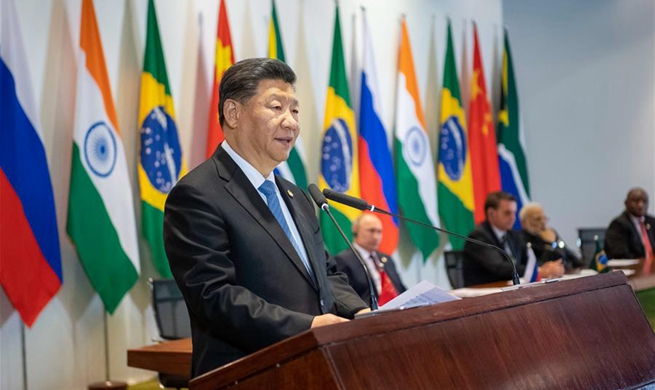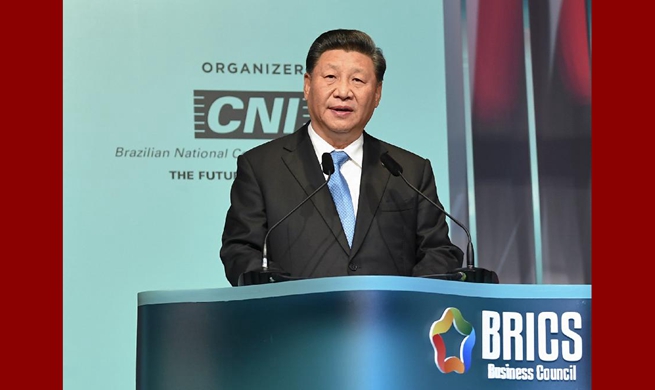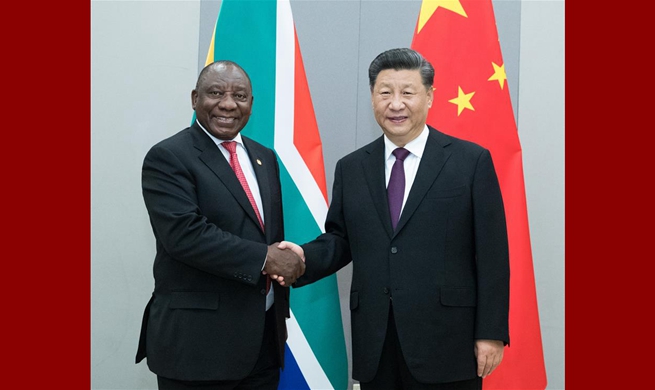ISTANBUL, Nov. 16 (Xinhua) -- The recent meeting between the Turkish and U.S. presidents at the White House simply served to temporarily decrease strain in bilateral ties without settling any of the major problems between the two NATO allies, Turkish analysts said.
"I don't think this meeting would have any significant impact, positive or negative, on bilateral ties," said Haldun Solmazturk, who chairs the Incek debates at the Ankara-based 21st Century Turkey Institute.
"The problems remain as before," he told Xinhua.
In a bid to sort out the growing problems in bilateral relations, Turkish President Recep Tayyip Erdogan met with his U.S. counterpart Donald Trump on Wednesday.
"The encounter ended with little progress to show, yet the leaders succeeded in giving an appearance of harmony and agreement," said Faruk Logoglu, a former senior diplomat.
Turkey-U.S. ties have soured in recent years due largely to Ankara's purchase of Russian-made S-400 air defense system, rapprochement between Ankara and Moscow and Washington's military support to the Kurdish militia in Syria.
A cross-border military operation Turkey launched last month against the U.S.-backed Kurdish militia in Syria, which Ankara sees as terrorists, further heightened tension in ties.
"The visit gave the two leaders a temporary respite, useful at home but it is one that simply delays the ultimate day of reckoning," Logoglu told Xinhua, saying nothing concrete appears to have come out of the summit.
Addressing a joint press conference following the summit, Trump said Turkey's acquisition of the S-400 "creates some very serious challenges" for Washington, while Erdogan did not touch on the issue.
The bilateral ties cannot flourish unless the S-400 issue is settled, a written White House statement said later in the day.
The only way for Turkey to avoid U.S. sanctions is to keep the S-400s inactivated, stated Solmazturk, a former general.
In his view, Erdogan may now change attitude regarding the Russian missiles.
The U.S. signaled earlier that it may be acceptable for Washington if the S-400s would remain out of service.
However, Erdogan's spokesman Ibrahim Kalin indicated on Friday that Ankara's attitude would not change.
"There is no stepping back. Turkey will activate the S-400," he told the state-run TRT Haber news channel, underlining that the missiles would not be integrated into the NATO system.
"The possibility of a modus vivendi reached on the S-400 issue in a one-on-one meeting between the two leaders is not to be ruled out," remarked Logoglu.
Jim Risch, chairman of the U.S. Senate Foreign Relations Committee, said on Thursday that it would be best for the Senate not to pass a sanctions bill on Ankara for the moment amid talks on the Russian missiles between the two sides.
"We think that there's going to be movement relatively soon on the S-400s," he said.
In response to the arrival of the S-400 system on Turkish territory in July, Washington kicked Ankara out of the stealth F-35 fighter jet project in which Turkey was a production partner.
It also put on hold the scheduled delivery of four F-35 jets to Ankara, while the U.S. Congress has passed sanctions bills against Ankara since July.
Ankara announced in early November that the delivery of a second batch of the S-400 system may be delayed amid talks on joint production and technology sharing.
It looks as if Turkey may give up on buying the second batch by stating its expectations as regards technology sharing are not being met by Moscow, said Solmazturk.
During the press conference, Erdogan once again tried to convince his U.S. counterpart to give up militarily supporting the Syrian Kurdish militia known as the People's Protection Units (YPG).
Trump said, however, the U.S. has great ties with the Kurds in Syria and he talked as if Ankara's military operation targeted the Kurds as a whole rather than the YPG, a distinction to which Turkey is very much sensitive.
Washington continues to see the YPG as an ally and a legitimate actor in Syria rather than a terror group, said Solmazturk.
"The U.S. got what it wanted," he said, arguing Washington's main objective was to dissuade Ankara from continuing with the military operation so that the YPG could emerge as a Kurdish political entity in Syria.
Just days before leaving for Washington D.C., Erdogan implied that Ankara could go ahead with the military operation as the YPG failed to honor a cease-fire deal concluded by Turkey and the United States on Oct. 17.
While at the press conference, the Turkish leader said Ankara would continue to respect the deal with Washington.
Still, Ankara may relaunch the military offensive if Erdogan thinks it would politically strengthen his hand at home, maintained Logoglu.
To punish Ankara for the cross-border operation, the U.S. House of Representatives passed highly offending resolutions against Ankara at the end of last month.
One is the recognition of the mass killings of Ottoman Armenians during the First World War as genocide, which, though legally non-binding, is the first in the history of the U.S. Congress.
A bill passed by the House calls for financial sanctions against Turkey's state-owned Halkbank and instructs the U.S. State Department to prepare a report on the personal finances and dealings of Erdogan and his family around the world.
"Coming at a critical time in the wake of two different House of Representatives resolutions targeting Turkey, it was in a sense a make-or-break summit for the two sides," stated Logoglu.
Erdogan's visit had more to do with fending off the sanctions targeting himself and the Halkbank, maintained Solmazturk. "With the visit, Erdogan appears to have eliminated the threat of an investigation into his and his family's financial assets," he said.
However, both analysts feel the larger sanctions threat against Turkey is always there, waiting to be reactivated in case of fresh disagreements with Washington.
Erdogan expressed resolve to open a new page in bilateral ties with Washington, but the analysts are skeptical about it.
Trump's vision of increasing bilateral trade volume to 100 billion U.S. dollars, up from around 20 billion dollars, is not realistic either, according to the analysts.
"The 100-billion-dollar trade volume target or Trump's call on Europe to help Turkey with the Syrian refugees are niceties with no real chance of realization," said Logoglu.


